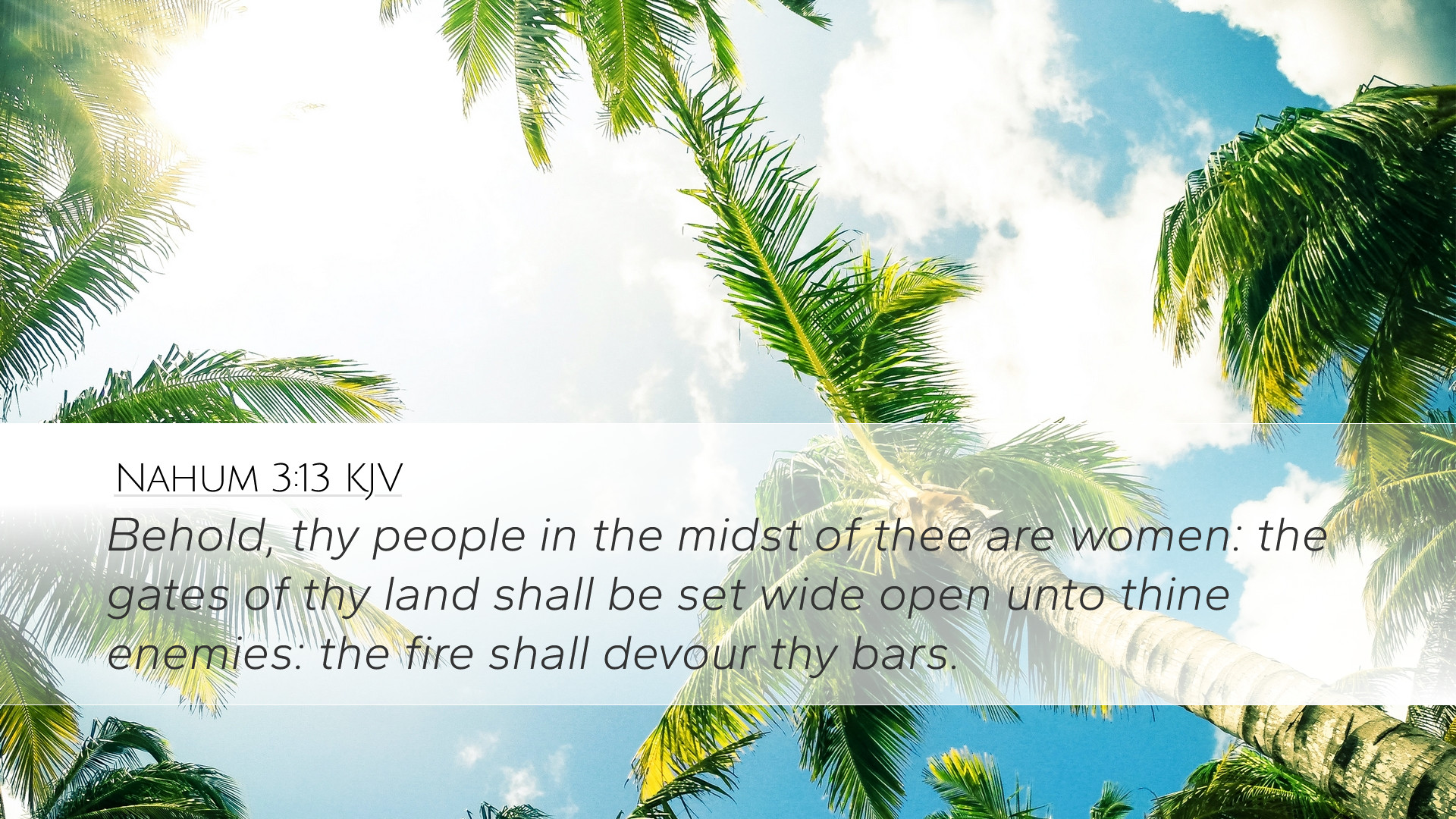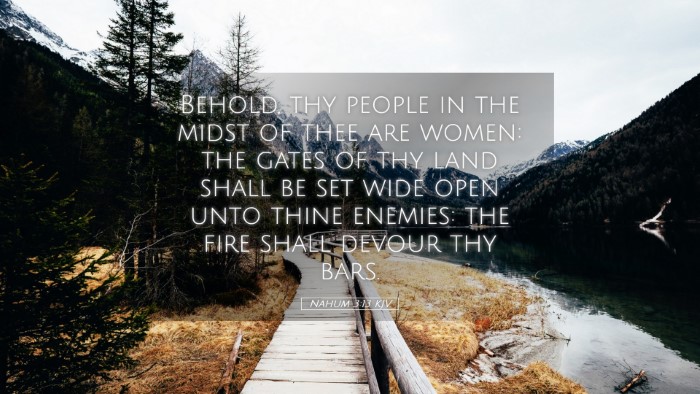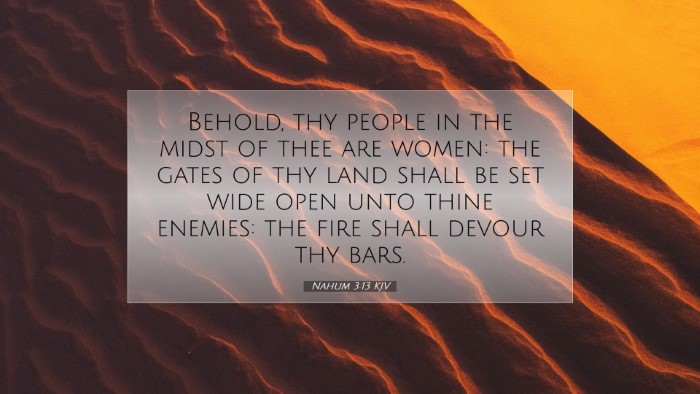Old Testament
Genesis Exodus Leviticus Numbers Deuteronomy Joshua Judges Ruth 1 Samuel 2 Samuel 1 Kings 2 Kings 1 Chronicles 2 Chronicles Ezra Nehemiah Esther Job Psalms Proverbs Ecclesiastes Song of Solomon Isaiah Jeremiah Lamentations Ezekiel Daniel Hosea Joel Amos Obadiah Jonah Micah Nahum Habakkuk Zephaniah Haggai Zechariah MalachiNahum 3:13
Nahum 3:13 KJV
Behold, thy people in the midst of thee are women: the gates of thy land shall be set wide open unto thine enemies: the fire shall devour thy bars.
Nahum 3:13 Bible Commentary
Nahum 3:13 Commentary
Verse: "Behold, thy people in the midst of thee are women: the gates of thy land shall be set wide open unto thine enemies: the fire shall devour thy bars."
Introduction
This verse from Nahum highlights a dire prophecy towards Nineveh, characterized by vulnerability and impending destruction. The prophet Nahum vividly describes the situation of the city. His words call attention to the weakness of Nineveh’s defenses and the impending doom that awaits the Assyrian capital.
Contextual Analysis
Nahum's prophecy is directed against Nineveh, the capital of Assyria, known for its brutality and oppression. The context of this chapter emphasizes the moral and spiritual decay of Nineveh, which, despite being a great city, had turned away from God and engaged in corruption and violence.
With a hierarchical structure in mind, the mention of the people being "as women" suggests vulnerability and the loss of strength, reflecting a state of helplessness before the oncoming enemy.
Commentary Insights
-
Matthew Henry’s Insights:
Henry interprets the phrase "thy people in the midst of thee are women" as an indication of the city's frailty and cowardice. He points out that men, who are usually depicted as defenders in times of conflict, have become ineffective, symbolizing the loss of morale. This metaphor not only depicts physical weakness but also spiritual vulnerability.
-
Albert Barnes' Perspective:
Barnes highlights the open gates of the city, signifying unrepaired defenses which invite invading forces. He expounds that the wide-open gates represent a lack of vigilance and preparation for conflict. The imagery of fire consuming the bars serves as a warning of complete desolation and the inevitable triumph of the enemies.
-
Adam Clarke's Commentary:
Clarke focuses on the socio-political implications of the verse. He notes the painting of a picture where enemies easily access the city reflects not only physical invasion but symbolizes the overarching divine judgment on Nineveh. Clarke emphasizes that the security which once characterized Nineveh is now gone, indicating divine abandonment and the fulfillment of prophetic warning.
Theological Implications
This verse serves as a stark reminder of God’s sovereignty over nations and His ability to bring judgment upon those who defy Him. The imagery of women in the city conveys a powerful theological message about the consequences of sin, highlighting that divine justice may be delayed but is ultimately certain. The fate of Nineveh underscores the stark reality of being opposed to God's will and the eventual downfall of those who refuse to repent.
Practical Applications
For pastors, students, and theologians, Nahum 3:13 challenges believers to consider how they cultivate spiritual strength and resilience. The imagery of vulnerability serves as a metaphor for the church today, emphasizing the need for steadfast faith and preparation against spiritual adversities. As leaders reflect upon this passage, it underscores the importance of not just physical defenses but also the cultivation of a strong community of faith that stands firm against challenges.
-
Encouragement to Maintain Vigilance:
Church leaders are reminded to keep watch over their congregations, ensuring that their gates—in terms of spiritual vigilance—are not left open to the encroachment of sin and moral decay.
-
The Call for Repentance:
This verse emphasizes the importance of repentance for both individuals and nations. Just as Nineveh faced destruction for its sins, contemporary believers are called to examine their lives and societies.
Conclusion
Nahum 3:13 serves as both a prophecy of doom for Nineveh and a theological lesson for all generations. The warnings depicted by the prophet are timeless, emphasizing the vulnerability of neglecting moral and spiritual righteousness. As believers engage with this text, they are reminded of the consequences of straying from God's path and the importance of maintaining their defenses through faith and collective adherence to divine principles.


